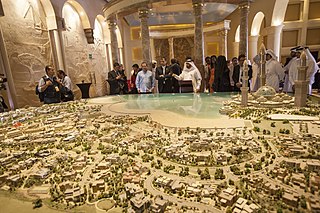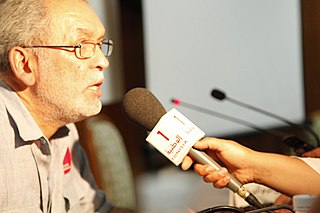Related Research Articles

The political system of Qatar is a de-facto absolute monarchy with the Emir of Qatar as head of state and head of government. Under the 2003 constitutional referendum it should be a constitutional monarchy with an elected legislature, although elections have been consistently pushed back since 2013. Sharia law is the main source of Qatari legislation.

The Universal Declaration of Human Rights (UDHR) is an international document adopted by the United Nations General Assembly that enshrines the rights and freedoms of all human beings. It was accepted by the General Assembly as Resolution 217 at its third session on 10 December 1948 at the Palais de Chaillot in Paris, France. Of the 58 members of the United Nations at the time, 48 voted in favour, none against, eight abstained, and two did not vote.

Deaf culture is the set of social beliefs, behaviors, art, literary traditions, history, values, and shared institutions of communities that are influenced by deafness and which use sign languages as the main means of communication. When used as a cultural label especially within the culture, the word deaf is often written with a capital D and referred to as "big D Deaf" in speech and sign. When used as a label for the audiological condition, it is written with a lower case d. Carl G. Croneberg coined the term of "Deaf Culture" and he was the first to discuss analogies between Deaf and hearing cultures in his appendices C/D of the 1965 Dictionary of American Sign Language.
Qatar Foundation for Education, Science and Community Development is a semi-private chartered, non-profit organization in Qatar, founded in 1995 by then-emir Sheikh Hamad bin Khalifa Al Thani and his second wife Moza bint Nasser. In addition to private funding, it is government-supported and in some ways government-funded. Qatar Foundation (QF), chaired by Sheikha Moza bint Nasser, has spearheaded Qatar's endeavors to establish itself as a leader in education, science, and cultural development on both a regional and global scale. QF has stated an aim "to support Qatar on its journey from a carbon economy to a knowledge economy by unlocking human potential."

Sheikh Tamim bin Hamad al-Thani is the Emir of Qatar. He is the fourth son of the previous Emir, Hamad bin Khalifa Al Thani. Tamim has held a variety of government posts within Qatar and has been at the forefront of efforts to promote sports and healthy living within the country. As of 2018, Tamim is the youngest reigning monarch among the GCC countries.
The Leadership Conference on Civil and Human Rights, formerly called the Leadership Conference on Civil Rights, is an umbrella group of American civil rights interest groups.

Qatar, officially the State of Qatar, is a country located in Western Asia, occupying the small Qatar Peninsula on the northeastern coast of the Arabian Peninsula. Its sole land border is with neighbouring Gulf Cooperation Council (GCC) monarchy Saudi Arabia to the south, with the rest of its territory surrounded by the Persian Gulf. The Gulf of Bahrain, an inlet of the Persian Gulf, separates Qatar from nearby Bahrain.

Qatar is a Muslim-majority country with Islam as the state religion. Salafi version of Islam is the state sponsored brand of Islam in the country, making Qatar one of the two Salafi states in the Muslim world, along with Saudi Arabia.

Mahnaz Afkhami is an Iranian women's rights activist who served in the Cabinet of Iran from 1976 to 1978.

The Qatari branch of the Red Crescent Society, the Qatar Red Crescent (QRC), was established in 1978. In 1981, it gained international recognition from the International Committee of the Red Cross in Geneva and joined the International Federation of Red Cross and Red Crescent Societies (IFRC). It is also a member of the Secretariat of Arab Red Crescent Societies in Jeddah. It became the first philanthropic organization in Qatar to establish a women's branch in 1982.

The state of human rights in Qatar is a concern for several non-governmental organizations.

Al Mamoura is a district in the municipality of Al Rayyan in Qatar. Many international schools are found here.
Qatar is a multi-religious society like most of the Persian Gulf countries with waves of migration over the last 30 years, Muslims form 67.7% of the Qatari population, Hindus make up 13.8% and Christians make up 13.8% followed by Buddhists at 3.1% of the overall population, 0.7% follow other religions and 0.9% are unaffiliated to any religion, Qatar is also home to numerous other religions mostly from the Middle East and Asia.

Katara is a cultural village in Doha, Qatar. It is located on the eastern coast between West Bay and the Pearl.

The State of Qatar and the Republic of Turkey established bilateral relations in 1972. There has been ongoing cooperation and dialogue in regional and international issues since the 2010s, particularly in the Syrian Civil War and the Egyptian Crisis. Both countries also support the same groups in post-Gaddafi Libya. Most recently, Turkey provided diplomatic and food support to Qatar during the 2017 Qatar diplomatic crisis. Some political analysts claim that bilateral relations are mostly limited to political and military affinity, referring to the low trade volume, lack of trade agreements and absence of Turkish think tanks in Qatar.

Women in Qatar Qatar's policies regarding women's rights is restricted due to the male guardianship law. and restrictions influenced by the Wahhabi interpretation of Islam. Both women and men were enfranchised in the country at the same time, in 1999. Labor force participation rates of Qatari women are above the world average and among the highest in the Arab World, which comes mainly as a result of an increasing number of Qatari women who are attaining academic degrees.

Ali Khalifa Al-Kuwari is a Qatari democracy activist, author and professor. He has occupied several positions in the oil sector. He is known for editing the book The People Want Reform in Qatar Too, which was subsequently banned in Qatar due to its critical views of government policies. He is one of the primary advocates for political reform in the country.
The National Human Rights Committee (NHRC) is a government-appointed human rights commission based in the State of Qatar. Established in 2002, it has been tasked with the responsibility of overseeing and carrying out investigations on human rights abuses in the country.
Qatar National Vision 2030 is a development plan launched in October 2008 by the General Secretariat for Development Planning in the State of Qatar. The aim of QNV 2030 is to "transform Qatar into an advanced society capable of achieving sustainable development" by 2030. The plan's development goals are divided into four central pillars: economic, social, human and environmental development. The government seeks to meet development goals by developing a strong bureaucratic framework and implementing strategies to address the challenges presented in human development reports.

Kamel Jendoubi is a Tunisian politician and human rights activist.
References
- ↑ "About QCSCD". The Qatari Center of Social Cultural for the Deaf. Retrieved 5 December 2015.
- ↑ "Board of Honor". The Qatari Center of Social Cultural for the Deaf. Retrieved 5 December 2015.
- ↑ "Qatar Deaf: An Emerging Community". Deaf Unity. 12 July 2013. Retrieved 5 December 2015.
- ↑ "The State's Competent Authorities of Human Rights". Ministry of Foreign Affairs (Qatar). Retrieved 5 December 2015.
- ↑ "2013 survey of civil society organizations in Qatar" (PDF). National Human Rights Committee (NHRC). June 2013. p. 9. Retrieved 5 December 2015.
- ↑ "2013 survey of civil society organizations in Qatar" (PDF). National Human Rights Committee (NHRC). June 2013. p. 62. Retrieved 5 December 2015.
- ↑ "2013 survey of civil society organizations in Qatar" (PDF). National Human Rights Committee (NHRC). June 2013. p. 62. Retrieved 5 December 2015.
- ↑ Ayman Adly (6 May 2012). "Forum seeks to integrate deaf women into society". Gulf Times. Alt URL
- ↑ "Primary Health Care Corporation trains staff on use of sign language". Qatar Tribune. 29 December 2014. Retrieved 5 December 2015.
- ↑ "First International Forum for the Deaf Muslims". Governmental Committee For Coordinating Conferences and Events (Qatar). Retrieved 5 December 2015.
- ↑ "International forum on deaf Muslims begins". The Peninsula. 12 November 2013. Retrieved 5 December 2015.